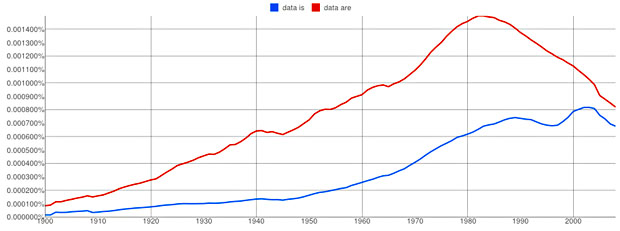The Wall Street Journal is the latest to succumb to the forces of goodness and light:
Most style guides and dictionaries have come to accept the use of the noun data with either singular or plural verbs, and we hereby join the majority.
As usage has evolved from the word’s origin as the Latin plural of datum, singular verbs now are often used to refer to collections of information: Little data is available to support the conclusions.
Otherwise, generally continue to use the plural: Data are still being collected.
(As a singular/plural test, try to substitute statistics for data: It doesn’t work in the first case — little statistics is available — so the singular is fails to pass muster. The substitution does work in the second case — statistics are still being collected – so the plural are passes muster.)
Well, they’ve halfway succumbed, anyway. But I won’t rest until they — and everyone else — accept the plain fact that data should be treated as a singular noun in all circumstances. The worst offenders here are generally in academia, and I’ve always wondered if they actually talk the same way they write. (I mean in casual speech, not prepared remarks.) I’m not sure I’ve ever heard anyone say “data are,” but lots of diehards with PhDs still use it in print.
Now, I know that lots of people continue to foolishly disagree with me about this, but I’m curious how far they’re willing to push things. If you had, say, five bits of information, would you say I only have five data? If you really, truly believe that data is a plural noun, you’d have no problem with this. But does anyone actually do it? Discuss in comments.
Need more data, first? The chart below is from the Google Ngram viewer and displays the frequency of data is vs. data are in books. I wouldn’t pay too much attention to the peak around 1980, which might just be an artifact of what Google happens to have in its memory banks,1 but the relative popularity of the two phrases is pretty clear. In 1940, data are was a 4:1 runaway winner. By 1980, its lead was about 2½:1. Today it’s barely in the lead at all. It clearly sounds as pretentious to lots of other ears as it does to mine.
1On the other hand, it might be real. If it is, I attribute it to large numbers of people giving up and deciding they don’t need grief from either faction in this war. As a result, more and more people are simply recasting their sentences to avoid having to use the phrase at all.


















